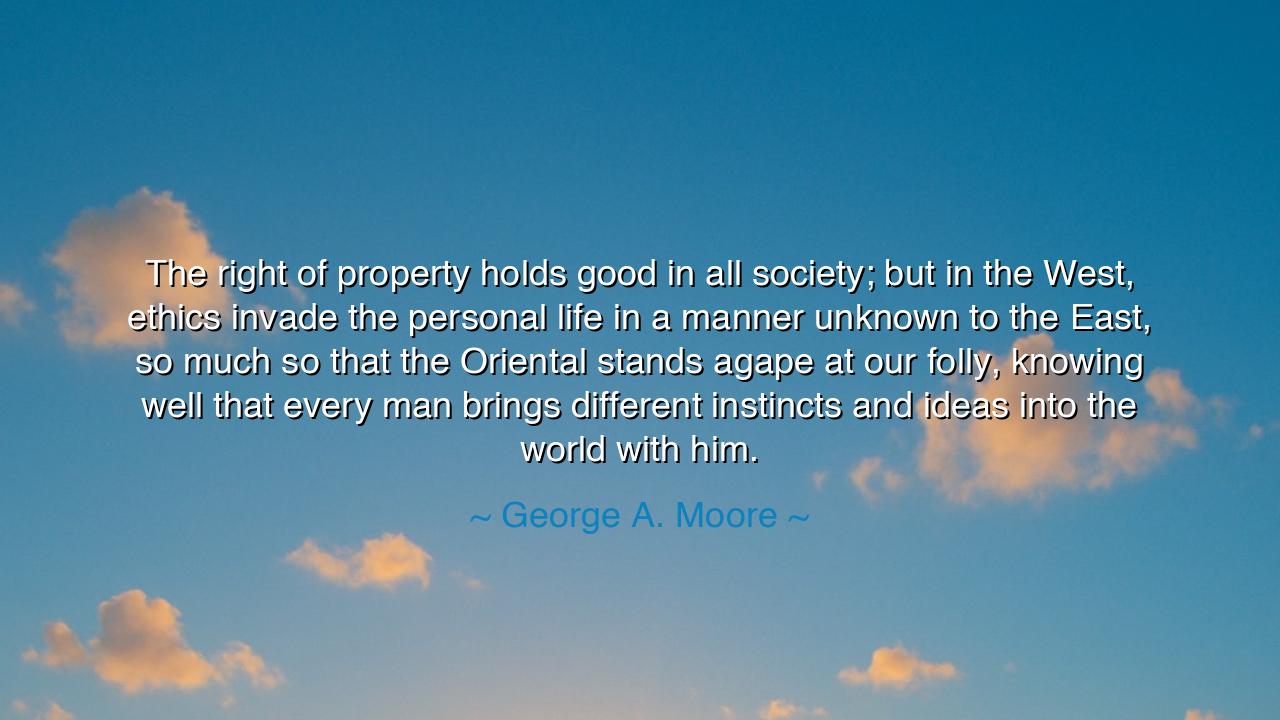
The right of property holds good in all society; but in the West
The right of property holds good in all society; but in the West, ethics invade the personal life in a manner unknown to the East, so much so that the Oriental stands agape at our folly, knowing well that every man brings different instincts and ideas into the world with him.






Hear the words of George A. Moore, spoken with a keen eye upon the divisions of culture: “The right of property holds good in all society; but in the West, ethics invade the personal life in a manner unknown to the East, so much so that the Oriental stands agape at our folly, knowing well that every man brings different instincts and ideas into the world with him.” In this utterance lies a reflection on the ways civilizations shape the balance between the individual and society, between ownership and morality, between what is universal and what is bound by culture. Moore proclaims that while property is recognized everywhere, the West burdens life with an excess of ethical intrusion, while the East, more attuned to human diversity, marvels at such rigidity.
The origin of this thought belongs to Moore’s role as a writer of the Irish Renaissance, who often examined contrasts between cultures. He lived in a time when the West prided itself on moral codes and rigid structures, not only in law but in private conduct, and yet also when colonial powers encountered the East, with its deep philosophies of tolerance for the multiplicity of human instincts. Thus, Moore’s words are not only observation but critique: he saw the folly of demanding conformity in matters of personal behavior, and he admired the Eastern recognition that men are born with varied instincts, destined to walk different paths.
The ancients, too, understood these truths. Consider the Stoics of Rome, who believed virtue was living according to nature. Yet the Roman state also bound citizens in rigid codes, regulating even personal freedoms, enforcing morality through laws and punishments. By contrast, in the East, the wisdom of Hinduism and Buddhism often acknowledged the many paths of the soul, affirming that men carried different karmas, instincts, and destinies. Moore thus draws from this ancient divide: one world insists on conformity of personal life, the other marvels at diversity of nature.
History gives us vivid examples. In Victorian England, property rights were sacred, but society invaded even the private chamber, prescribing how women must dress, how men must conduct themselves, what passions could be admitted or denied. Many lives were broken under this weight of public ethics masquerading as virtue. Meanwhile, travelers to the East encountered civilizations where spiritual variety was accepted, where sages taught that men carried different instincts and ideas into life, and the goal was not to suppress them but to guide them toward harmony. Moore’s comparison springs from this clash of civilizational temperaments.
The meaning of the quote is therefore clear: property may be a universal pillar of society, but ethics differ. When society overreaches into the inner life of its citizens, demanding sameness, it forgets that human beings are born diverse. To attempt to regulate the instincts of man as if they could be erased is not wisdom but folly. Moore admires the East for standing “agape” at such attempts, for recognizing what the West too often denied—that individuality is not a problem to be solved, but a reality to be embraced.
What lesson, then, shall we take from this? That while order and law are necessary, they must not suffocate the spirit. Guard property as a shared foundation, but do not mistake regulation of possessions for the right to regulate the innermost chambers of human nature. Let society make room for difference, for the soul’s variety is part of creation’s design. When we demand sameness of instinct, we break men; when we accept diversity of instinct, we elevate all.
Therefore, children of the future, engrave this wisdom upon your hearts: a just society must balance law with freedom, and property with individuality. Beware the excess of ethics that seeks to dictate the private life, for such zeal destroys what it hopes to preserve. Instead, honor the truth that every man and woman is born with unique instincts, different ideas, and distinct destinies. In respecting this diversity, society will find harmony; in denying it, society will reap only folly. And in this balance lies the endurance of civilization itself.






AAdministratorAdministrator
Welcome, honored guests. Please leave a comment, we will respond soon